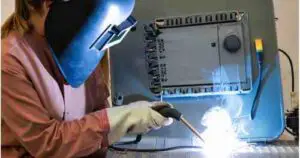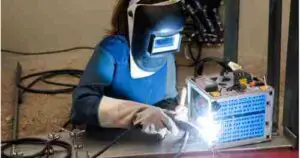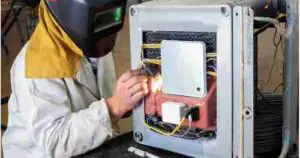In the realm of welding, technological progress has ushered in substantial changes and enhancements. One remarkable innovation that has completely transformed the welding landscape is the inverter welder. In this comprehensive article, we will not only answer the question, What is an inverter welder but also take an in-depth journey into the realm of these welding marvels. We will explore their fundamental workings, enumerate their advantages, and shed light on why they have evolved into an essential instrument, catering to the needs of both professional welders and avid DIY enthusiasts.
Understanding the Basics
Welding is an essential process in various industries, from construction to automotive repair. Over the years, welding technology has evolved, and one of the most significant advancements is the introduction of inverter welders. These compact and versatile machines have gained popularity for their efficiency, portability, and ability to produce high-quality welds. In this article, we will explore what inverter welders are and why they have become a game-changer in the welding world.
What is an Inverter Welder?
An inverter welder is a type of welding machine that utilizes inverter technology to convert AC (alternating current) power into DC (direct current) power. Unlike traditional welding machines that rely on transformers and rectifiers to generate the necessary welding current, inverter welders use electronic components to achieve this conversion. This technology allows for precise control of the welding current and voltage, resulting in smoother and more stable arcs.
How Does an Inverter Welder Work?
Inverter welders work by first converting the incoming AC power to DC power using a rectifier. Then, this DC power is passed through an inverter circuit, which rapidly switches the current on and off. The high-frequency switching creates a stable arc that is ideal for various welding processes, including TIG (Tungsten Inert Gas), MIG (Metal Inert Gas), and Stick welding. The ability to control the arc precisely is one of the key advantages of inverter welders.
Advantages of Inverter Welders
Inverter welders offer several advantages over traditional welding machines:
- Portability: Inverter welders are compact and lightweight, making them easy to transport to job sites.
- Energy Efficiency: They are more energy-efficient, reducing electricity consumption.
- Precise Welding: The precise control of current and voltage results in high-quality welds.
- Versatility: Inverter welders can handle a wide range of welding processes.
- Reduced Downtime: They have fewer components, reducing the risk of breakdowns and maintenance.
Types of Inverter Welders
There are various types of inverter welders available in the market, each designed for specific welding applications. Some common types include:
- TIG Inverter Welders: Ideal for precise and clean welding on materials like stainless steel and aluminum.
- MIG Inverter Welders: Great for fast and efficient welding on a variety of materials.
- Stick Inverter Welders: Suitable for heavy-duty welding tasks and outdoor use.
Choosing the Right Inverter Welder
When selecting an inverter welder, consider factors such as the type of welding you’ll be doing, the materials you’ll be working with, and your budget. It’s essential to choose a welder that suits your specific needs to achieve the best results.
Setting Up Your Inverter Welder
Proper setup is crucial for safe and efficient welding. Follow the manufacturer’s instructions for assembling and connecting your inverter welder. Ensure that you have the appropriate safety gear, including a welding helmet, gloves, and protective clothing.
Safety Precautions when Using an Inverter Welder
Safety should be a top priority when working with any welding equipment. Some essential safety precautions when using an inverter welder include:
- Wearing appropriate safety gear
- Working in a well-ventilated area
- Securing workpieces and cables
- Inspecting equipment for damage before use
Common Applications of Inverter Welders
Inverter welders find applications in various industries, including:
- Construction
- Automotive
- Metal fabrication
- Home repairs
- DIY projects
Their versatility and ease of use make them a valuable tool in any welding project.
Maintenance and Care of Inverter Welders
To ensure the longevity and performance of your inverter welder, regular maintenance is essential. Keep the machine clean, inspect cables and connections, and follow the manufacturer’s recommended maintenance schedule.
Comparing Inverter Welders to Traditional Welding Machines
Inverter welders have several advantages over traditional welding machines, including better energy efficiency, portability, and precision. However, the choice between the two depends on your specific welding needs and budget.
Future Trends in Inverter Welder Technology
As technology continues to advance, we can expect further improvements in inverter welder technology. These may include enhanced control interfaces, increased energy efficiency, and more compact designs.
FAQs about Inverter Welders
Q1: Are inverter welders suitable for beginners? A1: Yes, inverter welders are user-friendly and suitable for both beginners and experienced welders.
Q2: Can I use an inverter welder for aluminum welding? A2: Yes, many inverter welders are capable of welding aluminum when used with the appropriate welding process.
Q3: Do inverter welders require special power outlets? A3: Inverter welders typically operate on standard household power outlets.
Q4: What is the lifespan of an inverter welder? A4: The lifespan of an inverter welder depends on usage and maintenance but can last for many years with proper care.
Q5: Can I use an inverter welder for heavy-duty industrial welding? A5: Some inverter welders are designed for heavy-duty industrial applications, but it’s essential to choose the right model for your specific needs.
inverter Welder VS. Transformer Welder
Conclusion
Inverter welders have revolutionized the welding industry with their efficiency, portability, and precision. Whether you’re a professional welder or a DIY enthusiast, understanding the benefits of inverter welders can enhance your welding experience. As technology continues to advance, these machines are expected to play an even more significant role in welding processes across various industries.




1 thought on “What is an Inverter Welder? Unveiling the Secrets!”